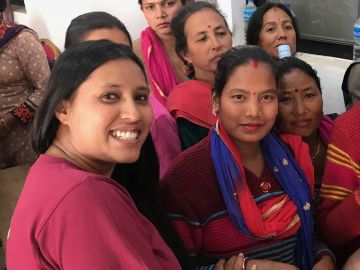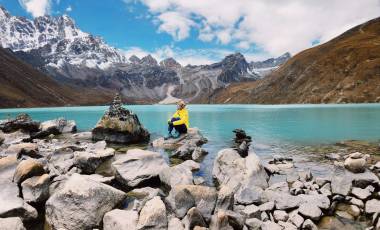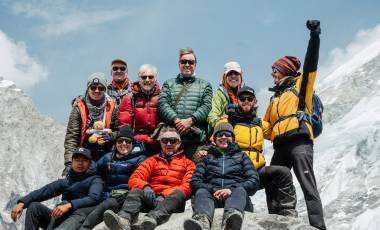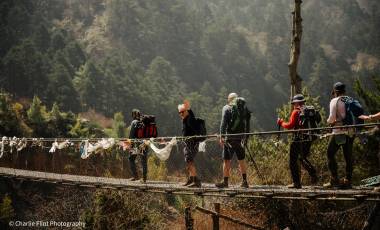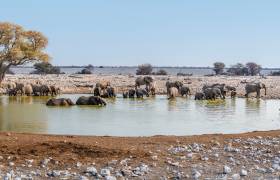Read time – 4 minutes
From the prayer flag-spangled base camp of Everest to the silent jungle of Chitiwan National Park and its incredible wildlife, Nepal is a country of contrasts unlike anywhere else on the planet.
It’s a hiker’s haven that draws in countless trekkers and vacationers each year. It offers myriad rewards for those willing to make the journey. But, what about the people who call Nepal home?
Giving Back to Nepal
At Exodus, we firmly believe in giving back to the communities that give so much to us. That’s why we’re proud to sponsor Freedom Kit Bags – eco-friendly, sustainable, hygienic sanitary wear – to rural and low-income communities across Nepal; locations where many girls and women don’t have access to disposable sanitary products.
Freedom Kit Bags were developed by Beni Rani Ghale, a Nepali woman who campaigns tirelessly to help and empower women, and Dr Rosa Matheson, who campaigns on women’s issues in Nepal. They allow girls to have uninterrupted learning and give them dignity and freedom of movement during a time which they have long been shamed for.
These kits give women the eco-friendly products they need, as well as the knowledge they have been denied on menstruation and how to avoid infection.
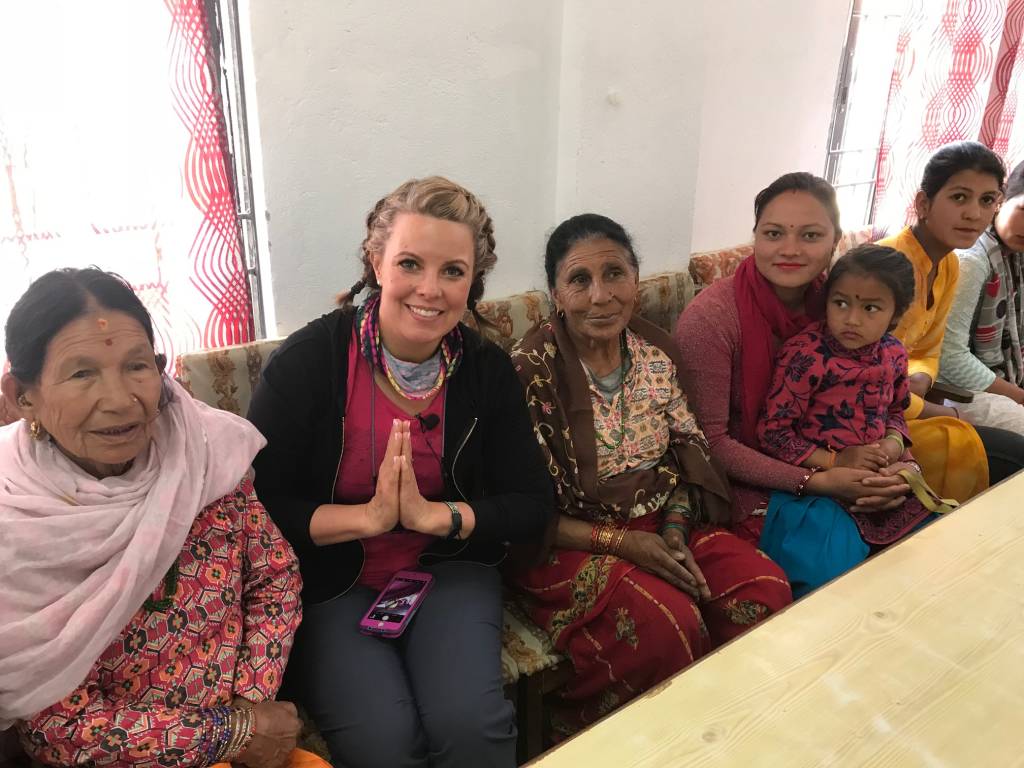 Nepalese women
Nepalese women
Did you know?
Though the Nepal we know and love is home to an abundance of once-in-a-lifetime opportunities, some of its cultural practices go back centuries and are unlike what we know at home. When Nepalese women have their period, they are referred to as “chhaupadi” which translates to “untouchable being”.
The result: Nepalese women not being able to continue life as they normally would during their period, which in many cases means young girls and women cannot attend school, go to work, or live their day-to-day life for an entire week each month.
It goes without saying that there is a lack of education and understanding of the functions of the body regarding menstruation and reproduction within Nepal. Take that and add in the traditional religious beliefs and superstitions the country is raised on and the extreme poverty that many people in rural Nepal live with and it’s no surprise there is such a negative view towards menstruation and how to properly handle it.
Though this is changing in many parts of Nepal, the more rural villages are not quite so quick to adopt these new views. In most instances, even if the resources existed, there is no money available for non-essentials and unfortunately, sanitary wear is deemed non-essential.
The lack of hygienic protection due to these cultural norms and the lack of funds also means that many village women suffer from infections which then lead to other health issues such as infertility, kidney complications and pelvic infections.
Being able to stay clean and healthy during this time is not only vital to the overall health of women, but also for their personal empowerment. If you improve the life of a woman, you help the family and therefore improve the life of the community.
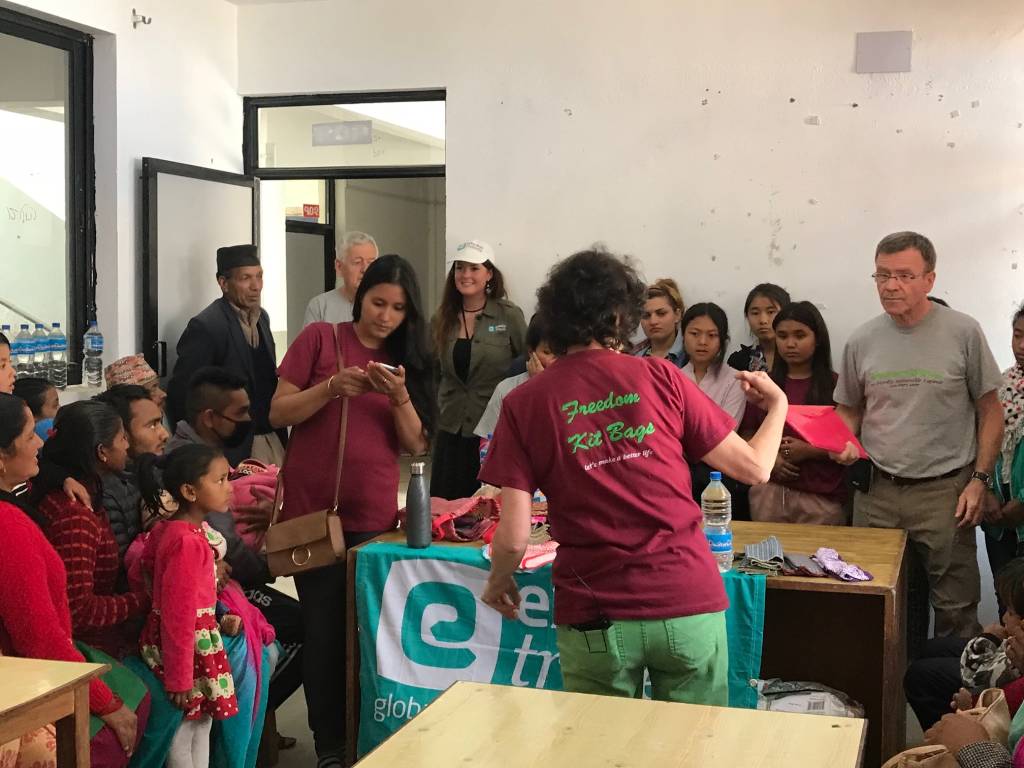 Providing women with Freedom Kit Bags
Providing women with Freedom Kit Bags
Doing our part
Below is a list of everything women receive in the Freedom Kit Bags. What started as just reusable sanitary pads has evolved into a full kit with soaps, night and day pads, underwear, and information on how to properly care for themselves throughout their period.
The kits are typically distributed on a training day, where both men and women are advised on how to properly handle menstruation. It’s surprising to see that many women and girls don’t even have underwear as a starting point – a good reminder of how lucky we are to have the access and knowledge that we’re so accustomed to.
For every $40 that we raise, one kit is provided, which offers 2 years of protection for a woman or girl. That is just $1.60 per month.
Since 2017, Exodus has donated over 1000 Freedom Kit Bags to rural communities across Nepal. Distributed to the women and girls of Sindapulchowk, the patients and staff through Charikot Hospital and Jiri Health Centre, and to women and girls in Sinu Sirawari.
What’s in the kit?
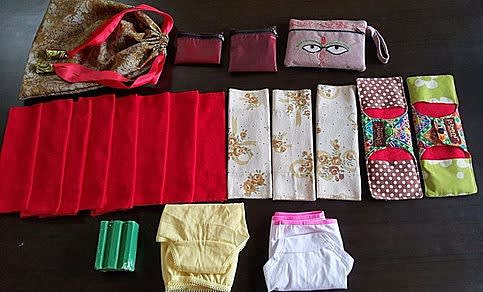 Freedom Kit Bag
Freedom Kit Bag
ATTRACTIVE KIT BAG
This keeps the kit together in a clean, accessible place.
12 LARGE COMFORTABLE PADS AND 6 INSERTS
To give women greater flexibility for individual use and preference. These pads absorb the blood and are washable. There needs to be enough to have some in the wash and some ready to be used.
3 PAD HOLDERS
These waterproof pad holders clip around the knickers, holding the pads in place.
3 NIGHT PADS
Thicker pads for use at night so there is no risk of soiling bedclothes. It is common for women and girls to be turned out of bed or the house because of this.
3 PAIRS OF UNDERWEAR
Provide protection and a way to keep the pads in place. Most rural women do not have these.
3 CARRYING PURSE
An attractive purse allows women to carry clean or soiled pads with them without being embarrassed.
1 WET BAG
For holding soiled pads securely.
1 SOAP BAG & SOAP
Soap is part of the hygiene programme, to educate women about keeping themselves clean.
STRING AND PEGS
Washing lines cost money, so these ensure that the pads are hung up and air dried hygienically, and not in bushes or grass.
INFORMATION SHEET
To educate women on menstruation and they ways to prevent infections.
Check out the video below to see what a training day with Freedom Kit Bags looks like!
See our tours to Nepal below and visit the country for yourself.
